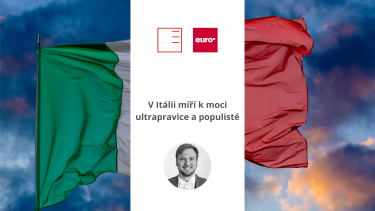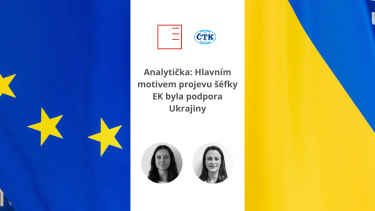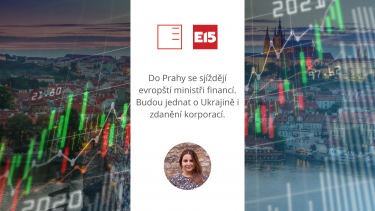Týdeník Euro: The far-right and populists are coming to power in Italy
Due to the premature fall of Draghi's government, Italians will go to the polls on Sunday 25 September. At stake, among other things, is how Rome will deal with the €200 billion covid bailout. Our research associate Alexandre Lagazzi has commented on the current situation.
Show more
iRozhlas: EU energy milestones: covid, green alternative, Russian attack and the search for consensus
iROZHLAS has prepared an overview of the energy measures discussed by the European Union in the context of the energy crisis. The review shows that the EU's securing of the energy market is not in line with the actions taken by national states. This inconsistency was also commented on by our researcher Michal Hrubý, who pointed to the need to proceed to a comprehensive solution at the level of the European Commission.
Show moreČTK: Analyst: The main motive of the EC chief's speech was support for Ukraine
In an article by the Czech News Agency (ČTK), two of our experts - Kateřina Davidová and Jana Juzová - comment on the speech of the President of the European Commission, Ursula von der Leyen. Davidová evaluated mainly the content of the speech concerning energy, while Juzová focused on the issue of strengthening democracy on the European continent and the EU's enlargement towards the Western Balkans.
Show more
INVITATION | EU-Pacific Talks: EU – ASEAN relations: For better and for worse
We would like to invite you to the debate called "EU – ASEAN relations: For better and for worse" in the EU-PACIFIC Talks series. The debate will take place online on our Facebook on Tuesday, September 27 at 11:00.
Show more
E15: European finance ministers arrive in Prague. They will discuss Ukraine and corporate taxation
On Friday, European energy ministers, finance ministers, and EU central bank chiefs will arrive in Prague. EcoFin - the two-day meeting will focus on the economic impact of the war in Ukraine, but also on reforms of the tax system. Our project manager Kristína Chlebáková commented on this topic for the internet portal E15.
Show moreKorea on Point: Neither Eastern Europe nor North Korea but the Indo-Pacific is the Future: The Prospects and Challenges for EU-Korea Relations under the Yoon Ad
Tereza Novotná, an associate research fellow at our Institute, wrote an article for Korea on Time, where she argues, that from a security perspective, the EU-South Korea partnership has been marked by three key topics: the Russian war of aggression in Ukraine, North Korea, and US-China strategic competition. It would be a smart choice for Yoon’s team to continue and expand on the New Southern Policy rather than trying to come up with a new framework. In the end, it will be neither Eastern Europe nor North Korea but the Indo-Pacific which will hold the key to the future of the EU-Korea partnership.
Show more
E15: Ukraine has been resisting Russian aggression for six months. A severe winter will test Western solidarity.
The Russian invasion of Ukraine has been going on for half a year. Despite constant fighting and pressure from Russia on Ukraine, the Russian Federation has failed to conquer Kiev. On the surface, it may appear that the war has stalled, but this is merely a deliberate tactic by Ukraine not to engage in major operations, but to wear down the Russian army. Western unity may be affected by new leadership in Italy and the UK, for example. However, the Czech Republic can play an important role, as it currently holds the Presidency of the Council of the European Union. Our researcher Danielle Piatkiewicz also commented on the topic.
Show moreEU MONITOR: Putin's Disinformation & Misinformation Campaign
Disinformation and misinformation have been amplified in the digital age. In order to combat their increasing presence in our everyday lives, we have to first educate ourselves on what disinformation is. In this post, Jakub Ferencik looks at this question in some detail, primarily by analyzing Vladimir Putin’s usage of disinformation in politics.
Show more PDF

RTVS: Some EU countries are returning to coal energy
The return of coal as a source of electricity production is a direct consequence of the Russian aggression in Ukraine. The resumption of coal-fired power stations in Europe means an increase in harmful emissions, jeopardizing the EU's climate targets. EUROPEUM Institute researcher Kateřina Davidová spoke in detail about the energy crisis in Europe, the measures that Brussels is taking to prevent countries from turning to sources of electricity such as coal, and the compensatory measures taken by member states.
Show more
Staroměstské náměstí 4/1
Prague 1 - Staré Město
110 00
tel.: +420 212 246 552
email: europeum@europeum.org
https://www.europeum.org









